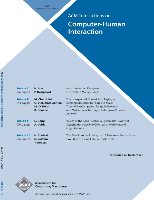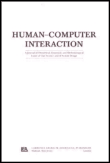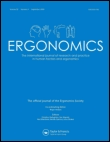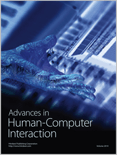
ACM Transactions on Computer-Human Interaction
Scope & Guideline
Bridging the Gap Between Users and Technology
Introduction
Aims and Scopes
- Human-Computer Interaction (HCI) Design:
The journal publishes research that explores innovative designs for interfaces and interactions, focusing on enhancing user experience and usability across various contexts. - User Experience and Usability Studies:
A significant emphasis is placed on empirical studies that assess user satisfaction, usability, and engagement, providing insights into how users interact with technology. - Social and Cultural Impacts of Technology:
Research often investigates the societal implications of technology use, including issues of privacy, accessibility, and the impact of digital tools on marginalized communities. - Cognitive and Behavioral Aspects of Interaction:
The journal includes studies that examine the cognitive processes involved in human-computer interaction, including attention, memory, and decision-making. - Interdisciplinary Approaches:
TOCHI encourages interdisciplinary research that incorporates perspectives from psychology, design, computer science, and social sciences to understand and improve human-computer interaction. - Emerging Technologies in HCI:
The journal explores the implications of emerging technologies such as AI, VR/AR, and IoT on user interaction, focusing on novel applications and design challenges.
Trending and Emerging
- AI and Human-AI Collaboration:
Research exploring the integration of AI in user interactions, including how AI can support human decision-making and creativity, is increasingly prevalent as AI technologies become more sophisticated. - Mental Health and Wellbeing Technologies:
A growing number of studies focus on how technology can support mental health, including digital interventions and tools for emotional regulation and stress management. - Inclusivity and Accessibility in Design:
There is a heightened focus on designing technology that is inclusive and accessible for diverse populations, including those with disabilities and marginalized communities. - Ethics and Trust in Technology:
Emerging themes around the ethical implications of technology use, particularly concerning data privacy, algorithmic bias, and user trust, are becoming central to HCI discussions. - Social Computing and Community Engagement:
Research increasingly addresses the role of technology in facilitating social interactions, community building, and collaborative work, reflecting a shift towards understanding technology's social dimensions.
Declining or Waning
- Traditional Usability Testing Methods:
While usability testing remains important, there is a noticeable shift away from conventional methods towards more innovative and participatory approaches, such as co-design and participatory design. - Focus on Physical Interaction with Technology:
Research centered solely on physical interaction techniques, such as gesture-based controls, is becoming less frequent as the journal broadens its scope to include emotional and cognitive engagement with technology. - Single-User Interaction Studies:
There is a declining focus on studies that only consider single-user interactions, as more research emphasizes collaborative and social interactions in digital environments. - Static Interface Design:
The emphasis on static or traditional interface designs is waning in favor of adaptive, context-aware, and dynamic interfaces that respond to user needs and environments.
Similar Journals

HUMAN-COMPUTER INTERACTION
Elevating Usability and User Experience StandardsHUMAN-COMPUTER INTERACTION is a premier academic journal published by Taylor & Francis Inc, dedicated to the interdisciplinary field of HCI, which explores the dynamic interactions between humans and computers. With its ISSN 0737-0024 and E-ISSN 1532-7051, the journal maintains a strong presence within the academic community and is recognized for its significant impact, holding a commendable impact factor that underscores its relevance. Ranked in the Q1 category for both Applied Psychology and Human-Computer Interaction, it occupies a critical position in Scopus rankings, listed as #15 in Applied Psychology and #11 in Computer Science, Human-Computer Interaction, placing it in the top 6% of relevant fields. Covering a broad spectrum of topics from usability studies to user experience design, the journal aims to facilitate innovative research and provide insights that bridge theoretical frameworks and practical applications. Published since 1985 and continuously evolving, HUMAN-COMPUTER INTERACTION remains an essential resource for researchers, professionals, and students eager to contribute to and benefit from advances in understanding how technology can effectively serve human needs.

Computers
Empowering Scholars in Computer Networks and BeyondComputers is a leading journal published by MDPI, dedicated to advancing research in the fields of computer networks and communications, as well as human-computer interaction. Since its inception in 2012, it has established itself as a vital resource for scholars and practitioners, achieving an impressive Q2 ranking in Computer Networks and Communications and a Q3 ranking in Human-Computer Interaction as of 2023. The journal is indexed in Scopus, highlighting its relevance with a rank of #135/395 and #72/145 in their respective categories. Published in Switzerland, this open-access journal ensures widespread dissemination of research findings, supporting the global academic community in enhancing technologies relevant to computer science. Access options are available, fostering an environment where knowledge is shared freely. With an emphasis on innovation, redesign, and collaboration between humans and technology, Computers plays a crucial role in shaping the future of digital interactions.

Multimodal Technologies and Interaction
Fostering Innovation in Digital User Experiences.Multimodal Technologies and Interaction, published by MDPI since 2017, is an esteemed open-access journal based in Switzerland, dedicated to the exploration and advancement of innovative multimodal systems that enhance user experience across various digital platforms. With its commitment to disseminating high-quality research in diverse areas such as Computer Networks and Communications, Human-Computer Interaction, and Neuroscience, the journal has rapidly established itself within the academic community, achieving a commendable position in Scopus rankings including Q2 in both Computer Networks and Communications and Computer Science Applications. As an essential resource for researchers, professionals, and students alike, Multimodal Technologies and Interaction fosters interdisciplinary dialogue and supports the development of cutting-edge technologies, ensuring that advancements in multimodal interaction are accessible to a global audience. Scholars can benefit from its Open Access format, allowing unrestricted access to influential studies that shape the future of technology and interaction design.

Universal Access in the Information Society
Advancing digital inclusivity in today's information landscape.Universal Access in the Information Society is a distinguished academic journal published by SPRINGER HEIDELBERG, focusing on the critical fields of computer networks, human-computer interaction, information systems, and software. Established in 2003, this periodical aims to disseminate innovative research that tackles the challenges of universal access to information and communication technologies, making it a vital resource for researchers, professionals, and students dedicated to enhancing digital inclusivity. With a commendable impact reflected in its Scopus rankings, it places in the second quartile for Computer Networks and Communications and Information Systems, as well as in the third quartile for Human-Computer Interaction, verifying its pivotal role in advancing knowledge within these domains. Although currently not open access, the journal offers comprehensive insights that are essential for anyone looking to contribute to or comprehend the evolving landscape of information societal access. The journal's commitment to bridging knowledge gaps makes it indispensable for both academic and practical applications in the Information Society.

Frontiers in Computer Science
Fostering collaboration for groundbreaking advancements in technology.Frontiers in Computer Science is a premier open-access journal published by Frontiers Media SA that has rapidly established itself as a prominent platform for scholarly research in the diverse and evolving field of computer science. With a notable impact factor reflecting its high citation rates, this journal aims to disseminate innovative findings and groundbreaking studies across multiple subdisciplines, including Computer Science Applications, Computer Vision and Pattern Recognition, and Human-Computer Interaction. Since its inception in 2019, and with a consistent trajectory from 2019 to 2024, it has garnered accolades, achieving Q2 ranking in several categories and an impressive Q1 in miscellaneous areas of computer science. Researchers, professionals, and students alike are encouraged to contribute to this dynamic journal that serves as a vital resource for advancing knowledge and fostering collaborative dialogue in the global computer science community. Frontiers in Computer Science is committed to providing open access to research, promoting unrestricted sharing of ideas and fostering innovation at the intersection of technology and society.

THEORETICAL ISSUES IN ERGONOMICS SCIENCE
Shaping the Future of Ergonomic TheoryTHEORETICAL ISSUES IN ERGONOMICS SCIENCE, published by Taylor & Francis Ltd, is an essential academic journal that delves into the complexities of ergonomics and human factors, catering to researchers and professionals in the field. With an ISSN of 1463-922X and an E-ISSN of 1464-536X, this journal has established itself as a significant contributor to scholarly discourse since its inception in 2000. Operating out of the United Kingdom, it has earned a respectable Q3 ranking in Human Factors and Ergonomics as of 2023, reflecting its impactful research contributions within the social sciences. The journal aims to foster interdisciplinary dialogue and innovation, addressing key theoretical frameworks that influence ergonomic practices and research. While offering a traditional publication model, it is committed to maintaining high academic standards, as indicated by its position in the 64th percentile among its peers, ranking #17 out of 46 within its category in Scopus. THEORETICAL ISSUES IN ERGONOMICS SCIENCE is an indispensable resource for those seeking to enhance their understanding and application of theoretical concepts in ergonomics, and a platform for disseminating cutting-edge research findings.

ERGONOMICS
Exploring innovative solutions for optimal performance.ERGONOMICS is a premier journal that serves the dynamic fields of Human Factors and Ergonomics, as well as Physical Therapy, Sports Therapy, and Rehabilitation. Published by Taylor & Francis Ltd in the United Kingdom, this journal not only boasts a commendable impact factor but also holds a Q2 quartile ranking across its categories, underscoring its influence and academic rigor. With a convergence of significant research dating back to 1957, ERGONOMICS provides a multifaceted platform for the dissemination and discussion of innovative findings that enhance the interaction between people and their environments. Although the journal does not offer Open Access options, it remains a vital resource for researchers, professionals, and students seeking to deepen their understanding of ergonomic principles and applications. Positioned at the intersection of health and human behavior, ERGONOMICS is dedicated to advancing knowledge and promoting best practices in an era where the demand for safe and efficient work environments continues to grow.

Journal of Computer Languages
Shaping the Landscape of Digital CommunicationJournal of Computer Languages, published by ELSEVIER SCI LTD in the United Kingdom, serves as a crucial platform for advancing research and discussion in the fields of computer networks, human-computer interaction, and software development. With an ISSN of 2590-1184 and E-ISSN 2665-9182, this journal has established itself as a prominent resource within its category, achieving Q3 rankings in 2023 across its respective domains. As part of Scopus' indexed journals, it stands at impressive ranks of #152/395 in Computer Networks and Communications, #172/407 in Software, and #76/145 in Human-Computer Interaction, reflecting its relevance and contribution to the scholarly community. Operating under an open access model, the journal emphasizes accessibility and collaboration among researchers, professionals, and students keen on exploring innovative applications and advancements in computer languages. With a publication span extending from 2019 to 2024, the year-to-year growth reinforces its commitment to impacting both academia and industry significantly. Engage with cutting-edge research and foster your understanding in computer languages through this essential publication.

Advances in Human-Computer Interaction
Pioneering advancements in user experience and design.Advances in Human-Computer Interaction is a premier peer-reviewed journal published by HINDAWI LTD, dedicated to the exploration of cutting-edge research and innovation in the field of Human-Computer Interaction (HCI). With an ISSN of 1687-5893 and an E-ISSN of 1687-5907, this Open Access journal has been contributing to the scientific community since 2008, offering unrestricted access to critical findings and advancements. Based in Egypt with an address at ADAM HOUSE, 3RD FLR, 1 FITZROY SQ, LONDON W1T 5HF, ENGLAND, it occupies a notable position in the academic landscape, reflected in its 2023 Scopus ranking of Rank #57/145 and a 61st percentile in the Human-Computer Interaction category. As a Q3 journal, it plays a crucial role in disseminating research that bridges the gap between humans and technology, providing valuable insights for researchers, professionals, and students pursuing expertise in this dynamic field. The journal’s converged years from 2010 to 2024 signify its ongoing commitment to advancing knowledge and fostering collaboration among HCI experts worldwide.

Computers in Human Behavior Reports
Transforming understanding of human-machine interactions.Computers in Human Behavior Reports, published by ELSEVIER, is a distinguished open-access journal dedicated to advancing interdisciplinary research at the intersection of technology and human behavior. Since its inception in 2020, the journal has quickly gained a prominent position in the academic field, attaining Q1 category rankings in multiple areas including Applied Psychology, Artificial Intelligence, Cognitive Neuroscience, Human-Computer Interaction, and Neuroscience (miscellaneous). Its robust standing is evidenced by its exceptional Scopus ranks, particularly in Neuroscience—where it is positioned 4th out of 49 journals—demonstrating a high level of influence and engagement within the community. The journal's aim is to disseminate cutting-edge research findings and foster dialogue among researchers, professionals, and students alike, thereby addressing crucial questions regarding the impact of technology on human behavior and vice versa. As an open-access publication based in the United Kingdom, it not only enhances the visibility of research but also ensures wider accessibility to groundbreaking insights that shape our understanding of human-machine interactions.